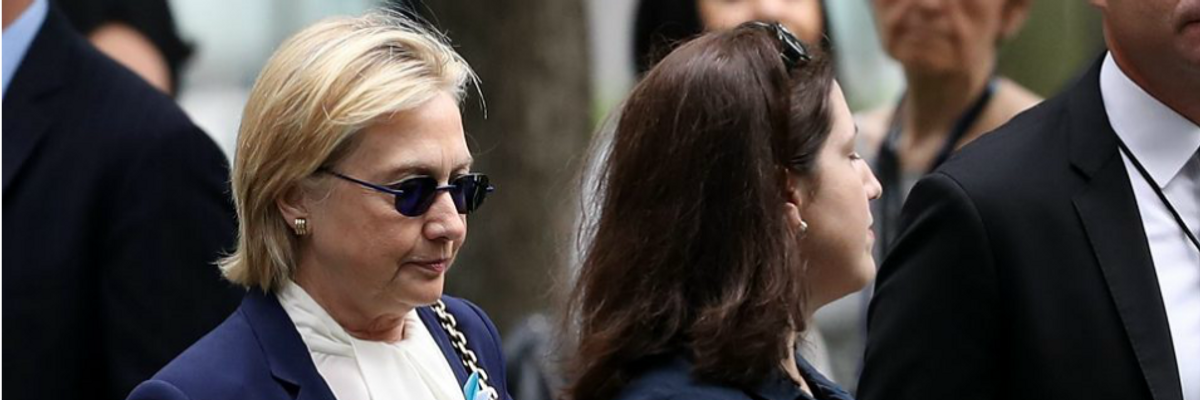Hillary Clinton was feeling a little woozy. On Sunday morning, after standing around for an hour and a half at the 9/11 memorial event at Ground Zero, possibly while wearing a bullet proof vest in 80 degree heat, the 68-year-old Democratic nominee felt a bit less than well, and left the event early. She was even seen to wobble a bit, and buckle at the knees, before she was into a waiting vehicle. Clinton later emerged from her daughter's apartment building, looking completely recovered.
That afternoon, we learned that Hillary Clinton was just doing what millions of Americans do every day: going to work sick. Clinton's longtime physician, Dr. Lisa Bardack, M.D., announced that the candidate had pneumonia, and had been advised to rest. Clearly, that's not advice that Clinton has been inclined to take. Not only did she show up for the 9/11 memorial, but for the past few days Clinton had been campaigning -- flying back and forth, holding multiple events and briefings, etc. -- with pneumonia. Who wouldn't have been worse for wear by Sunday?
"Millions of Americans ... have to 'power through' worse things than the cough that plagued Clinton in the days before the 9/11 memorial."
In the midst of the presidential campaign, Clinton may thought she didn't have time to be sick, and couldn't afford to take several days off. "Like a lot of people, I thought I could keep going forward and power through it," Clinton told CNN's Anderson Cooper on Monday, "and obviously that didn't work out so well."
Powering through illness is something millions of Americans do every day. The difference is that many of them don't have much of a choice. They have to "power through" worse things than the cough that plagued Clinton in the days before the 9/11 memorial.
We're not talking about what's been labeled "presenteeism" -- working while sick, in order to prove you're a hard worker, and not weak or fragile. Some people with severe cases of "presenteeism" are high-achievers like Clinton, who may be too driven to listen to their bodies and call in sick when they need to. Others, feeling the pressure of a "can't-quit economy," and desperate not to appear expendable, show up to cough and sniffle their way through the work day when they'd rather be at home in bed. (With the advent of telecommuting, there's a new strain of "virtual presenteeism" that has many of us showing up for conference calls, and putting in a full day's work from home, despite being sick.) Most sufferers of presenteeism have paid sick leave, and don't use it.
We're talking, here, about the nearly 40 percent of American workers who have no paid sick days. That's about 44 million people who can -- and do -- get sick, but don't get paid if they take a sick day. Most of them are low-wage workers, who can't afford to miss even one day's pay.
"Workers without paid sick days are 1.5 times more likely to report to work with contagious illnesses, like the flu."
Some of them are the people who handle and prepare your food. Only about 10 percent of restaurant workers have paid sick leave, and 60 percent say they come to work sick, and risk making both their co-workers and customers sick. Remember earlier this year, when dozens of people got sick after eating at Chipotle? Well, the company claims that at least two of those outbreaks were due to employees coming to work sick and spreading norovirus, despite Chipotle being one of just a few in the restaurant industry to offer paid sick leave.
The US is one of the few advanced nations that does not mandate paid sick leave for workers.Almost every other developed nation did it years ago. Just five states (California, Connecticut, Massachusetts, Oregon, and Vermont), one county (Montgomery County, Maryland), and the District of Columbia have paid sick leave laws on the books. Two states, Arizona and Washington, have initiatives on the ballot this year to provide workers with paid sick days. Studies of jurisdictions that have passed paid sick leave show that it's not a "job killer," nor is it bad for business. In fact, paid sick leave saves employers money by reducing turnover.
Workers without paid sick days are 1.5 times more likely to report to work with contagious illnesses, like the flu. In fact, if the US were to mandate paid sick leave, national flu rates would decrease by 5 percent. That's a big deal, considering that 5 to 20 percent of Americans get the flue each year, costing the country about $87 billion. Not to mention that thousands of Americans die every year from the flu.
Presidential candidates and their campaigns aren't immune. Apparently, there was an outbreak of respiratory illness among Hillary Clinton's senior campaign staff. With just 54 days left until the election, Clinton and her staff may not feel they can afford many days off, but at least her platform calls for paid family and medical leave for workers who truly can't afford to call in sick. Donald Trump's does not.
